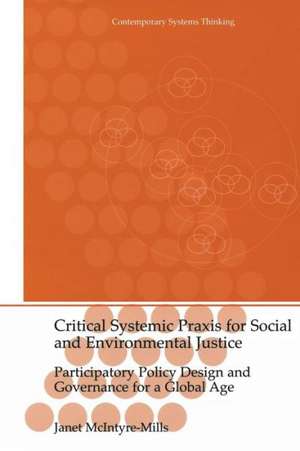Critical Systemic Praxis for Social and Environmental Justice: Participatory Policy Design and Governance for a Global Age: Contemporary Systems Thinking
Autor Janet McIntyre-Millsen Limba Engleză Paperback – 24 sep 2012
The key themes address the issue that:
-Management needs to be more systemic. Critical Systemic Praxis is the process whereby we find ways to work across discipline areas and sectoral areas, in order to address complex social, political, economic and environmental problems.
-The way we define and address problems depends on an ability to work with, rather than within knowledge areas.
-By introducing the notion of governance we can extend traditional management from an organisational context to an inter-organisational context and locate governance as the goal for sustainable social and environmental justice.
The core aspects of praxis are:
-Respectful listening and dialogue to set up appropriate contexts for participatory design.
-Participatory designs based on participatory action research to map tacit and explicit knowledge of participants (professional and ordinary citizens).
-Strategic decision making across discipline areas, cultural contexts and knowledge areas.
-Action learning to transfer the policy and practice learnings.
-Mainstreaming the approach to governance in the social, political, economic and environmental sectors.
The book develops a systemic approach to public policy issues. Examples are used throughout to exemplify theory. The integrated approach to policy and practice is ideally suited to addressing the socio-economic and environmental issues.
| Toate formatele și edițiile | Preț | Express |
|---|---|---|
| Paperback (1) | 649.54 lei 43-57 zile | |
| Springer Us – 24 sep 2012 | 649.54 lei 43-57 zile | |
| Hardback (1) | 658.55 lei 43-57 zile | |
| Springer Us – 31 mai 2004 | 658.55 lei 43-57 zile |
Din seria Contemporary Systems Thinking
- 18%
 Preț: 966.27 lei
Preț: 966.27 lei - 15%
 Preț: 646.75 lei
Preț: 646.75 lei - 15%
 Preț: 643.34 lei
Preț: 643.34 lei - 15%
 Preț: 644.63 lei
Preț: 644.63 lei - 15%
 Preț: 657.25 lei
Preț: 657.25 lei - 18%
 Preț: 1219.94 lei
Preț: 1219.94 lei - 18%
 Preț: 950.21 lei
Preț: 950.21 lei - 18%
 Preț: 959.67 lei
Preț: 959.67 lei - 15%
 Preț: 672.95 lei
Preț: 672.95 lei - 18%
 Preț: 950.66 lei
Preț: 950.66 lei - 18%
 Preț: 981.61 lei
Preț: 981.61 lei - 18%
 Preț: 1119.56 lei
Preț: 1119.56 lei - 18%
 Preț: 1565.61 lei
Preț: 1565.61 lei - 18%
 Preț: 905.68 lei
Preț: 905.68 lei - 18%
 Preț: 948.47 lei
Preț: 948.47 lei - 18%
 Preț: 894.16 lei
Preț: 894.16 lei - 18%
 Preț: 1020.60 lei
Preț: 1020.60 lei - 18%
 Preț: 1226.42 lei
Preț: 1226.42 lei - 18%
 Preț: 950.84 lei
Preț: 950.84 lei - 15%
 Preț: 705.83 lei
Preț: 705.83 lei - 18%
 Preț: 953.03 lei
Preț: 953.03 lei -
 Preț: 390.08 lei
Preț: 390.08 lei - 15%
 Preț: 646.11 lei
Preț: 646.11 lei - 18%
 Preț: 891.80 lei
Preț: 891.80 lei - 15%
 Preț: 647.08 lei
Preț: 647.08 lei - 18%
 Preț: 949.42 lei
Preț: 949.42 lei - 15%
 Preț: 653.14 lei
Preț: 653.14 lei -
 Preț: 381.21 lei
Preț: 381.21 lei - 15%
 Preț: 652.17 lei
Preț: 652.17 lei - 18%
 Preț: 960.61 lei
Preț: 960.61 lei - 18%
 Preț: 733.96 lei
Preț: 733.96 lei -
 Preț: 392.21 lei
Preț: 392.21 lei - 18%
 Preț: 957.44 lei
Preț: 957.44 lei - 15%
 Preț: 649.06 lei
Preț: 649.06 lei
Preț: 649.54 lei
Preț vechi: 764.17 lei
-15% Nou
Puncte Express: 974
Preț estimativ în valută:
124.29€ • 130.10$ • 103.45£
124.29€ • 130.10$ • 103.45£
Carte tipărită la comandă
Livrare economică 31 martie-14 aprilie
Preluare comenzi: 021 569.72.76
Specificații
ISBN-13: 9781461347217
ISBN-10: 1461347211
Pagini: 484
Ilustrații: XIX, 460 p.
Dimensiuni: 155 x 235 x 25 mm
Greutate: 0.67 kg
Ediția:2003
Editura: Springer Us
Colecția Springer
Seria Contemporary Systems Thinking
Locul publicării:New York, NY, United States
ISBN-10: 1461347211
Pagini: 484
Ilustrații: XIX, 460 p.
Dimensiuni: 155 x 235 x 25 mm
Greutate: 0.67 kg
Ediția:2003
Editura: Springer Us
Colecția Springer
Seria Contemporary Systems Thinking
Locul publicării:New York, NY, United States
Public țintă
ResearchCuprins
1. Introduction: Axial Themes United in Space and Time.- 1.1. The Relevance of an Ideographic Case Study and Narrative Approach as a Vehicle for Critical Systemic Praxis (CSP).- 1.2. The Audience and the Relevance of Critical Systemic Thinking to Planning and Policy: Implications for Accountable Policy and Practice.- 1.3. Setting the Demographic, Socio-Cultural, Political and Economic Context of CS.- 1.4. A Mandala to Heal Divided Thinking: Narratives for Understanding Culture and the Tension Between Totalising and Critical Approaches.- 2. Participatory Design and the Heart of the Process.- 2.1. Introduction and Rationale.- 2.2. The Principles of PAR.- 2.3. PAR for Planning and Problem Solving.- 2.4. The Aim and Focus.- 2.5. The Indicators.- 2.6. Ethical Considerations.- 3. Globalisation, Citizenship and Critical Systemic Thinking for Policy Development Through Participation, Observation and Research.- 3.1. Interactive Policy Design via Communities of Practice to Address Current Development Challenges.- 3.2. Governance, Management and Social Policy.- 3.3. The Complex Policy Context of Postwelfarism in a Remote Region of Australia.- 3.4. Implications for Social Policy and Governance.- 3.5. Reflection on the Theoretical and Methodological Orientation and Tools: Implications for Accountable Policy and Practice.- 3.6. The Nature of the Identified Complex Social Issues.- 4. Missionary, Mercenary, Misfit? Boundary Work and the Policy Research Process.- 4.1. Being Part of One’s Subject Matter and the Implications for Praxis.- 4.2. Entering the Field and Reflection on the Approach: Time, Space and Working the Hyphen.- 4.3. Location and Dislocation: The Space for Writing, Individuation, Recollection and Reflection.- 5. A Landscape of Multiple Cultures and Interest Groups: APanning Shot of Place.- 5.1. Cultures as Maps of Meaning.- 5.2. The Service Centre for the Remote Region.- 6. History, Citizenship, Life Chances and Property: Implications for Governance.- 6.1. Life in the Red Centre: Perceptions on Governance and Lifestyle: A Focusing Shot to Identify Key Issues.- 6.2. Drawing Together the Themes.- 6.3. A Historical Legacy of Colonisation and Marginalisation.- 6.4. The Local, National and International Context of Policy Decisions.- 6.5. Social Indicators of Well-Being and Life Chances.- 6.6. Physical and Mental Health Status Indicators.- 6.7. Health Services.- 6.8. Social Health Indicators of Poor Coping Behaviour, Alcohol and other Drugs.- 6.9. A Proposed Systemic Approach to Address the Causes and Effects of Alcohol and other Drugs.- 6.10. Environmental Health, Access to Services and Quality of Life.- 7. Systemic Approach to Address the Process of Commodification Rights, Reconciliation and Reality: Creating Opportunities for Participation and Spiritual Well-being.- 7.1. Social and Geographical Movement: Time, Space and Commodity-Exclusion as a Motivation for Land Rights.- 7.2. The Potential of Social Capital for Inclusive Governance.- 7.3. Development Approaches to Enhance the Life Chances of Young People and their Families.- 7.4. Promotion of Life Chances Through Enabling a Generative Learning Community Beyond the School Walls for Young People and their Families.- 7.5. Creation of Employment Pathways.- 8. Health, Education and Employment Articulating Axial Themes Through Participatory Design Processes.- 8.1. Resisting Commodification Across the Sectors of Health, Education and Employment.- 8.2. A Community of Practice.- 8.3. A Design for Participatory Governance.- 9. Conclusion: Addressing Complex Reality Systems, Barriers and Portals: Identity, Nationalism and Globalisation.- 9.1. Summing up the Challenges for CSP.- 9.2. Policy Suggestions and Interactive Design.- 9.3. Building and Sustaining Life-Long Learning.- 9.4. Building the Capacity to Make Sense of Data and Information for Decision-Making.- 9.5. The Contributions of CSP.- 9.6. Post script: Yeperenye Dreaming in Conceptual Geographical and Cyberspace.


















